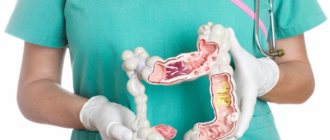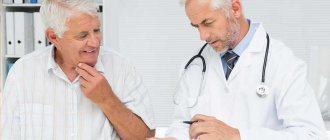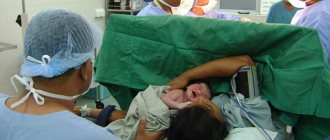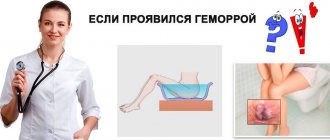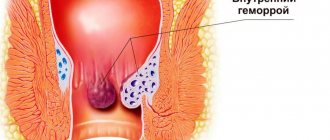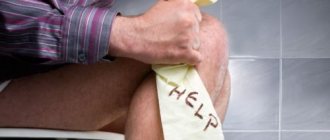Doctor treating hemorrhoids - proctologist
Which doctor treats hemorrhoids? Basically, people who are faced with pronounced symptoms of this disease, which they cannot cope with on their own, begin to ask these questions. You should not put off going to a specialist; under no circumstances should you think that the disease will go away on its own. This won't happen. Inaction will result in worsening symptoms and progression of the disease. Over time, hemorrhoids will still develop into a more acute stage.
Experts divide the disease into 4 stages. If you find out in a timely manner which doctor treats hemorrhoids in women and men, and immediately begin therapy, then in the first two stages you will be able to defeat the disease with medications. If you put off going to a specialist, then hemorrhoids will progress and it is very difficult to cure it at stage 3 with tablets, suppositories and ointments, and at stage 4 it is impossible. In advanced cases, you will have to get rid of the disease by resorting to the help of a surgeon.
Which doctor should I go to for hemorrhoids?
Since hemorrhoidal changes affect the final part of the digestive tract - the rectum, proctologists or, as they are commonly called according to modern conditions, coloproctologists are required to diagnose and treat the pathology. These are doctors who are in charge of any diseases of the colon, anus, and perineum.
According to statistics, 1/3 of the population suffers from diseases of this localization. The most dangerous disease is cancer, which is difficult to detect at an early stage. It “disguises” itself as other diseases or does not manifest itself at all.
Enlargement of hemorrhoids will be noticed during examination by gynecologists in girls and women, and urologists during examination regarding male problems. Adolescent boys must be examined by a surgeon when undergoing a medical examination at the military registration and enlistment office. Doctors refer patients to a coloproctologist and explain the need for a professional approach to the treatment of the disease.
Proctologists are available in regional hospitals. If such a specialist is not on your appointment schedule, you should make an appointment with a surgeon. After all, proctology is a branch of general surgery, so qualified doctors who conduct free outpatient visits have knowledge in this area (payment is made by the compulsory medical insurance fund).
There are enough coloproctologists in private clinics in regional centers. Before applying, it is better to inquire about the license, category of the doctor, and work experience in the specialty. The cost of the appointment may include an instrumental examination (anoscopy, sigmoidoscopy). This should be found out in advance and prepared not only financially.
If bleeding or acute pain occurs in the anus, you must call an ambulance. The attack may be associated with thrombosis or strangulation of nodes. Delay in providing assistance leads to tissue death (necrosis) and a septic condition.
Causes of the disorder
In the next section, you will learn about which doctors treat hemorrhoids in women. However, have you ever thought that a visit to the clinic could have been avoided if the patient knew about the causes of the disease. If everything is more or less clear with men (hemorrhoids occur due to poor nutrition or heavy lifting), then not everyone knows about the factors that provoke the occurrence of pathology in the fair sex:
- stressful situations can provoke the development of a variety of ailments;
- dietary errors - eating food that causes diarrhea and constipation;
- anal sex – a man’s genital organ may be too wide;
- childbirth - overexertion during this process is common;
- pregnancy – the uterus often puts pressure on the internal organs;
- lifting weights, such as at the gym or at work;
- colon cleansing, especially in case of self-medication.
Almost each of these points takes place in the lives of most beauties. Of course, the disease may not occur in everyone and not at every age. However, if you are wondering which doctor a woman with hemorrhoids should contact first, then we will definitely help you answer it. In the next section you will find detailed information on this matter, as well as some recommendations that will be useful to the patient.
Proctologist and coloproctologist
In medicine, the names of doctors’ specialties are determined by the approved “List” of the Ministry of Health. In government agencies, they strictly monitor the compliance of the entry in the work book with the actual direction of work. Physicians familiar with Latin explain the replacement of the name “proctologist” with “coloproctologist” since 2014 by the expansion of the boundaries of the study of pathology from the isolated rectum to the entire large intestine.
In everyday life, both the old and the new name are valid, the meaning does not change. Doctors are trained on the basis of general surgery, specialization takes at least four months.
According to their place of work, coloproctologists are conventionally divided depending on their medical profile:
- as therapists - they deal with medicinal methods of treating hemorrhoids, parasitic and infectious diseases of the large intestine, Crohn's disease, various colitis;
- for surgeons - the profile indicates the use of minimally invasive methods, operations for tumors, hemorrhoids, and removal of polyps with an endoscopic apparatus.
How to prepare for a doctor's examination?
It is better to make an appointment with a coloproctologist on your non-working day. This is due to the need to prepare for the inspection. For conventional digital examination, preliminary bowel cleansing is desirable.
One day before, you should avoid foods that promote fermentation (gas formation) and stool retention. These include:
- milk;
- legumes;
- cabbage;
- fatty meat and fish;
- fried foods;
- sweets;
- confectionery;
- fresh bakery;
- strong tea and coffee;
- alcohol (including beer);
- pickles;
- sparkling water.
Smoking is not recommended.
In the evening you should do cleansing enemas twice, and one more early in the morning. If the condition does not allow you to postpone the procedure, then you can use rectal suppositories with glycerin, standard Microlax microenemas. They cause irritation to the nerve endings of the intestines and promote bowel movements after 20 minutes.
The best cleansing agents are laxatives that are specially created for bowel preparation (Duphalac, Fortrans, Lavacol). They should be taken according to the schedule the day before the examination.
Don't forget to take with you:
- passport, insurance policy, direction;
- a diaper (suddenly there will be no disposable sheets in the institution);
- shoe covers or replacement shoes;
- wet wipes.
For shy people, we advise you to purchase special underpants at the pharmacy in advance. They have a slot in the anus area.
In case your doctor needs additional blood tests, it is best to come to your appointment on an empty stomach.
Is an examination by a coloproctologist always painful?
When conducting an examination, the doctor takes into account the patient’s possible pain reaction, tense situation, and anxiety. Therefore, he tries to act slowly, maintaining verbal contact. The palpation procedure is usually painless, but unpleasant.
For pain, a tampon with dicaine ointment is inserted into the anus, and the outside of the sphincter is lubricated with lidocaine gel. Pain relief occurs after 20 minutes. Only then does the doctor insert a finger.
If a blue-black node is visible from the outside, then the examination is not carried out. The patient needs urgent removal of dead tissue.
Why should you see a doctor?
Symptoms of hemorrhoids significantly complicate a person’s life and change his character. Signs of the disease include:
- painful bowel movements;
- bleeding from damaged nodes;
- wetting of the skin around the anus with irritation, itching, erosion;
- sensation of external “bumps under the skin” or a foreign body in the anal canal.
The lack of constant treatment creates conditions for the appearance of cracks, ruptures and suppuration. Stagnant venous blood in the nodes forms clots and thromboses the lumen of the vessel. Acute thrombosis disrupts tissue nutrition, causing ischemia and necrosis. The patient's condition is accompanied by severe pain and intoxication.
If the blood clot along with the node is not removed in a timely manner, then disintegration and bleeding occurs. Bacterial infection of the cracks is quickly added from the intestines. Spread occurs in the tissue around the rectum. There is a threat of abscess, sepsis, and the formation of fistulas in neighboring organs.
Advanced cases will require significantly greater treatment efforts and extensive surgical intervention. Therefore, it is better to take the measures recommended by your doctor against hemorrhoids in the initial stages, without waiting for the process to progress.
Treatment methods for hemorrhoids in women, how to properly treat hemorrhoids?
Which doctor should a woman see for hemorrhoids? If this issue has become relevant, it is worthwhile to understand it thoroughly. Hemorrhoids are part of the group of diseases of the rectum. Therefore, all the manifestations that make up its clinical picture belong to the field of proctology. If a woman has discovered characteristic painful formations in her anal canal and has recorded bleeding from the anus, then she should ask a coloproctologist all questions about her condition. This is exactly the doctor who treats hemorrhoids in both women and men, regardless of gender. According to international standards, this is now the customary name for proctologists. And most of them are men. Here you need to forget about awkwardness and false shame, discard all unreasonable embarrassment and go to a specialist who not only knows how to treat hemorrhoids, but will also be able to cure them, at any stage. A doctor treating hemorrhoids will treat his patient with great attention and will not allow any jokes about her condition.
Who should a woman contact if she has hemorrhoids?
“Hemorrhoids doctor” is a narrow specialization; not every clinic and hospital, especially in villages, has employees in this profile. In this case, the woman needs to see a therapist if the disease is chronic, or take a referral to a surgeon if the process is acute. But you shouldn’t go to a gynecologist - this doctor does not treat hemorrhoids in women. A vascular doctor is also competent in the treatment of female hemorrhoids. Inflammation of hemorrhoids is a pathology of the rectal veins. Therefore, you can safely contact a phlebologist or angiologist, which is the same thing. Effective treatment is directly related to a woman’s nutrition. Consultation with a nutritionist will also be useful. With an adjusted diet, symptoms will quickly subside. After the acute process has subsided, an instrumental study should be performed. In order to properly treat hemorrhoids in a woman in each specific case, the doctor will need data on the extent and nature of the disease. Treatment requires an individual approach. After all, the doctor’s task is to correctly diagnose, select the right technique and successfully apply it to obtain a good result. In proctology, they don’t shoot sparrows out of a cannon; treatment of hemorrhoids in women at an early stage differs from help with an advanced form.
Treatment methods for hemorrhoids in women
Conservative, or drug therapy, is used in the first two degrees to alleviate the condition during an exacerbation, that is, as a temporary measure.
This is mainly a local treatment for internal or external hemorrhoids. In cases of thrombosis, ointments such as Venobene, Gepatrombin, Gelpan, containing thrombolytic components, are used. It is important for women to remember that they can cause bleeding. It is better to treat inflamed hemorrhoids with hormones containing Aurobin, Ultraproct, Posterisan Forte, Proctosedyl. The last three drugs are also available in the form of rectal suppositories, indicated for internal hemorrhoids. The swelling will decrease and the pain will go away. For bleeding, applications with the hemostatic sponge Spongostan or Tachocomb have a good effect. Gauze lotions with Androxon solution are also convenient for women. But these are not budget drugs. If you are limited in funds, it is better to pay attention to suppositories and Relief Advance ointment, which contain quickly healing shark oil. You can stop minor bleeding with lotions with Etamsylate, Dicinone, Vikasol and even calcium chloride. The anesthetics Anestezol, Olestezin, and Anuzol are suitable suppositories for pain relief and treatment. What to do if hemorrhoids came out unexpectedly, the woman is staying with her grandmother in the village, and in the medicine cabinet there is only old methyluracil ointment? Definitely use it. A proven effective remedy will relieve inflammation and heal the wound. If a woman has chronic venous insufficiency and, in addition to hemorrhoids, has problems with dilated veins in the legs, the doctor may recommend taking venotonic drugs (angioprotectors): Detralex, Phlebodia, Troxevasin, Venoruton (in tablets), Procto-Glivenol (suppositories or ointment). Minimally invasive, otherwise with minimal penetration of the doctor’s hands, interventions are carried out using an anoscope and are used only for the treatment of internal hemorrhoids. The condition for their use is the absence of inflammation and anal fissures. At the early (first) stage, when the bumps are still small, sclerotherapy has proven itself well. A drug is injected into hemorrhoidal formations with a syringe, the action of which is aimed at stopping the blood supply to the cones with their further death and falling off. This method of treatment is low-traumatic even in the case of fragile veins, and is also suitable for older women. It is convenient when you need to process several plexuses at the same time.
Recently, infrared photocoagulation has become popular, effective for grade 1 and 2 complications of bleeding. Treatment consists of spot cauterization of the stalk of the formation with a coagulant. During one procedure, only one lump is affected. The manipulations are quite painful; pain relief is required.
No less popular is ligation with latex rings. It is also performed in a clinic setting at 2nd and 3rd degrees. An elastic ring tightly wraps around the stem of the prolapsed hemorrhoid, blocking the access of nutrition to the blood vessel. Within 14 days, the process of death of the tissue of the cone occurs and ends with its rejection together with the ring. Ligation is not used if the internal hemorrhoid is closely adjacent to the external one.
The new Japanese method of treating hemorrhoids in women - disarterization or suture ligation - gives a minimal percentage of relapses. An ultrasound probe (Doppler) detects the arteries supplying the plexuses. The surgeon's task is to stitch them and bandage them. The prolapsed lumps are straightened, stitched and secured in the rectum. After a month, the suture material dissolves. The operation requires local anesthesia, most often spinal anesthesia is used. Desarterization allows you to cope with hemorrhoids of 1-3 degrees.
Know-how of proctology - Longo's hardware method. During the operation, part of the rectal mucosa is excised and sutured with titanium staples. In this case, the plexuses are not removed, but are pulled up. Deprived of blood supply, they quickly shrink and later become overgrown with connective tissue. The anal canal is anatomically restored. The Longo intervention is considered gentle, there is usually no pain, analgesics are not required in the postoperative period, and the woman can go to work on the 5th day after treatment. All minimally invasive interventions can cure internal hemorrhoids quickly, provided that the doctor’s work is correct and the recommendations are followed during the recovery (very short) period.
A thrombosed hemorrhoidal node causes hard-to-bear suffering for a woman. First aid for complicated external female hemorrhoids is to remove clotted blood from the prolapsed plexus. The doctor makes a 5 mm incision and removes the clot. 7-10 minutes of surgical time will be required to remove the lump and relieve acute pain.
Doctors usually advise treating external hemorrhoids with conservative therapy for as long as possible and using a scalpel only if there is a significant decrease in quality of life. One can understand a woman who wants to remove a bump for aesthetic reasons, even if, apart from its size, it doesn’t particularly bother her. But the doctor most likely will not support her in this and will offer therapeutic treatment. How long does it take to treat hemorrhoids with dosage forms? Recovery may take 2 weeks, or maybe a month.
Hemorrhoidectomy is performed in a hospital setting strictly according to indications in late (4th) and advanced 3rd degree. During the operation, all altered tissue is radically removed, and the vessels supplying blood to it are ligated. This treatment method remains the most popular today, despite the active introduction of new minimally invasive technologies. A woman of working age is certainly concerned about how long it will take to recover after surgery? On average, the rehabilitation period lasts up to 3 weeks, wounds heal longer - 3-7, sometimes 10 weeks. But experienced proctologists give the best guarantees of recovery in favor of this method.
zhkt.guru>
What other doctor in the clinic can cure hemorrhoids?
If there is no coloproctologist in the clinic, patients are received by:
- A local therapist will suspect the disease based on its symptoms and prescribe medications and local rectal suppositories to relieve pain and inflammation. He will not be able to thoroughly conduct a digital examination or anoscopy. Will give a referral to the nearest clinic where there is a specialist.
- Obstetrician-gynecologist - sees external hemorrhoids in patients during pregnancy and examination in the postpartum period. Prescribes medications that have no contraindications for mother and fetus during lactation. After childbirth, he will refer the woman to a proctologist.
- A surgeon can temporarily replace a proctologist, conduct a digital examination, and prescribe the necessary medications. Depending on the stage of the disease, he will recommend a clinic where it is best to undergo surgery.
In the diagnosis and treatment of hemorrhoids, shyness leads to an uncontrollable process in the pelvic venous system. The longer a patient endures pain, the more difficult it is to stabilize the disease. The risk of complications and urgent surgical intervention increases. Timely consultation with a doctor and the choice of treatment method can prevent the painful signs of the fourth stage of hemorrhoids.
1Stages of the disease
There is a hereditary predisposition to hemorrhoids. In addition, hemorrhoids are promoted by:
- overweight, obesity;
- sedentary work, sedentary lifestyle;
- intense physical work;
- chronic stress;
- infectious intestinal diseases;
- bowel irregularities, constipation and diarrhea;
- a diet with a lot of foods that irritate the rectum;
- excessive consumption of alcohol and caffeine;
- insufficiency of venous blood supply to the lower part of the body, disruption of the venous outflow of blood from the pelvic organs and rectum;
- tumors and inflammatory processes in the intestines.
https://youtube.com/watch?v=LQiC9E0r0bg%3Ffeature%3Doembed%26wmode%3Dopaque
Hemorrhoids in men are often combined with an inflammatory process in the prostate gland, so men should go to a urologist and proctologist with hemorrhoids.
In women, hemorrhoids are especially common during pregnancy, just like varicose veins in the lower half of the body. To prevent hemorrhoids from affecting the course of labor, you need to consult a gynecologist about this. By what symptoms can a person suspect hemorrhoids? There are 4 stages of this disease.
- The first stage is the easiest. Internal, deep-lying venous vessels are affected. Externally, the violation is invisible, the patient does not experience any unpleasant sensations. The formation of hemorrhoids begins on the inside of the rectum. As the condition worsens, itching in the anus and discomfort during bowel movements appear. Only a proctologist can detect hemorrhoids at an early stage. Treatment is painless and quick, using sclerotherapy or photocoagulation.
- Second stage. The victim complains of burning and itching in the anogenital area, difficulty and pain during defecation. Blood may appear on toilet paper and underwear from anal fissures or injuries to hemorrhoids. The nodes begin to protrude; a person can detect external manifestations of hemorrhoids on their own. As the disease worsens, the nodes fall out during bowel movements. Bowel movement is accompanied by pain, blood and mucus discharge. These symptoms may indicate not only hemorrhoids, but also rectal cancer, proctitis, and intestinal polyposis. What is the name of the doctor who treats all diseases of the rectum? Proctologist, and according to new medical terminology, coloproctologist. After diagnosis, if tumors are found, the help of a surgeon or oncologist will be required. Conservative methods of treating stage 2 hemorrhoids include ligation and sclerotherapy.
- The third stage of hemorrhoids. The more the veins subside, the more the nodes protrude. At the third stage, you can straighten the knot only with the help of your hands; it just won’t retract. During physical activity, for example, when lifting a heavy object, the knots fall out and create a lot of inconvenience. Defecation is accompanied by pain, bleeding, and after defecation the patient suffers from burning, stinging and discomfort in the rectum. Conservative treatment carried out by a proctologist may no longer help at this stage. What is the name of the doctor who treats external hemorrhoids? Surgeon-proctologist. He performs node resection, an operation to remove all pathologically deformed areas of the rectum.
- The last stage of hemorrhoids. The knots fall out at the slightest tension in the abdominal muscles. It’s impossible to straighten the knots even by hand. Blood clots form in the venous vessels, blockage of small vessels occurs, and tissue death occurs.
The first stage is the easiest. Internal, deep-lying venous vessels are affected.
Second stage. The victim complains of burning and itching in the anogenital area, difficulty and pain during defecation.
At the third stage, you can straighten the knot only with the help of your hands; it just won’t retract.
Hemorrhoids are a progressive disease; without treatment, each victim moves at an individual speed towards the 4th stage. To avoid adverse consequences, you need to contact a coloproctologist who treats hemorrhoids. How are hemorrhoids treated at each stage? Is it possible to use traditional medicine methods?

